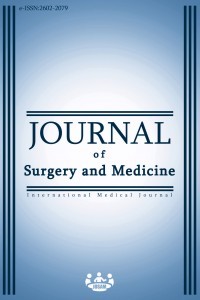MTHFR gen polimorfizmi olan hastalarda gebelik sonuçları: Vaka serisi
MTHFR C677T, MTHFR A1298C, Tedavi, İn-vitro fertilizasyon, Abortus, Komplikasyon
Pregnancy outcomes in patients with MTHFR gene polymorphism: A case series
MTHFR C677T, MTHFR A1298C, Treatment, In-vitro fertilization, Abortion, Complication,
___
- 1. Ueland PM, Hustad S, Schneede J, Refsum H, Vollset SE. Biological and clinical implications of the MTHFR C677T polymorphism. Trends in Pharmacological Sciences. 2001;22(4):195-201. doi: 10.1016/s0165-6147(00)01675-8.
- 2. Weisberg I, Tran P, Christensen B, Sibani S, Rozen R. A second genetic polymorphism in methylenetetrahydrofolate reductase (MTHFR) associated with decreased enzyme activity. Molecular genetics and metabolism. 1998;64(3):169-72.
- 3. Rozen R. Genetic predisposition to hyperhomocysteinemia: deficiency of methylenetetrahydrofolate reductase (MTHFR). Thrombosis and haemostasis. 1997;78(01):523-6.
- 4. Klerk M, Verhoef P, Clarke R, Blom HJ, Kok FJ, Schouten EG. MTHFR 677C→ T polymorphism and risk of coronary heart disease: a meta-analysis. JAMA. 2002;288(16):2023-31. doi: 10.1001/jama.288.16.2023.
- 5. Grandone E, Margaglione M, Colaizzo D, Cappucci G, Paladini D, Martinelli P, et al. Factor V Leiden, C> T MTHFR polymorphism and genetic susceptibility to preeclampsia. Thrombosis and Haemostasis. 1997;77(06):1052-4.
- 6. Blount BC, Mack MM, Wehr CM, MacGregor JT, Hiatt RA, Wang G, et al. Folate deficiency causes uracil misincorporation into human DNA and chromosome breakage: implications for cancer and neuronal damage. Proceedings of the National Academy of Sciences. 1997;94(7):3290-5.
- 7. Amin S, Issa H, Ramzy A. Prevalence/Incidence of Hereditary and Acquired Thrombophilia Markers among Egyptian Females with Recurrent Pregnancy Loss or IVF Failure. J Blood Disord Transfus. 2018;10(412):2.
- 8. Zappacosta B, Mastroiacovo P, Persichilli S, Pounis G, Ruggeri S, Minucci A, et al. Homocysteine lowering by folate-rich diet or pharmacological supplementations in subjects with moderate hyperhomocysteinemia. Nutrients. 2013;5(5):1531-43. doi: 10.3390/nu5051531.
- 9. Servy EJ, Jacquesson-Fournols L, Cohen M, Menezo YJR. MTHFR isoform carriers. 5-MTHF (5-methyl tetrahydrofolate) vs folic acid: a key to pregnancy outcome: a case series. Journal of Assisted Reproduction and Genetics. 2018;35(8):1431-5. doi: 10.1007/s10815-018-1225-2.
- 10. Turgal M, Gumruk F, Karaagaoglu E, Beksac M. Methylenetetrahydrofolate Reductase Polymorphisms and Pregnancy Outcome. Geburtshilfe und Frauenheilkunde. 2018;78(09):871-8. doi: 10.1055/a-0664-8237.
- 11. Long S, Goldblatt J. MTHFR genetic testing: controversy and clinical implications. Australian family physician. 2016;45(4):237.
- 12. Wu X, Zhao L, Zhu H, He D, Tang W, Luo Y. Association Between the MTHFR C677T Polymorphism and Recurrent Pregnancy Loss: A Meta-Analysis. 2012;16(7):806-11. doi: 10.1089/gtmb.2011.0318.
- 13. Brenner B, Hoffman R, Blumenfeld Z, Weiner Z, Younis J. Gestational outcome in thrombophilic women with recurrent pregnancy loss treated by enoxaparin. Thrombosis and haemostasis. 2000;83(05):693-7.
- 14. Cetin O, Karaman E, Cim N, Dirik D, Sahin HG, Kara E, et al. The impact of low molecular weight heparin on obstetric outcomes among unexplained recurrent miscarriages complicated with methylenetetrahydrofolate reductase gene polymorphism. Ginekologia Polska. 2017;88(5):260-5. doi: 10.5603/GP.a2017.0049.
- 15. Martinelli I, Ruggenenti P, Cetin I, Pardi G, Perna A, Vergani P, et al. Heparin in pregnant women with previous placenta-mediated pregnancy complications: a prospective, randomized, multicenter, controlled clinical trial. Blood, The Journal of the American Society of Hematology. 2012;119(14):3269-75.
- 16. Cao Y, Xu J, Zhang Z, Huang X, Zhang A, Wang J, et al. Association study between methylenetetrahydrofolate reductase polymorphisms and unexplained recurrent pregnancy loss: a meta-analysis. Gene. 2013;514(2):105-11.
- 17. Lykke J, Bare L, Olsen J, Lagier R, Arellano A, Tong C, et al. Thrombophilias and adverse pregnancy outcomes: results from the Danish National Birth Cohort. Journal of Thrombosis and Haemostasis. 2012;10(7):1320-5. doi: 10.1111/j.1538-7836.2012.04773.x.
- 18. Laanpere M, Altmäe S, Kaart T, Stavreus-Evers A, Nilsson TK, Salumets A. Folate-metabolizing gene variants and pregnancy outcome of IVF. Reproductive biomedicine online. 2011;22(6):603-14. doi: 10.1016/j.rbmo.2011.03.002.
- 19. Ahangari N, Doosti M, Mousavifar N, Attaran M, Shahrokhzadeh S, Memarpour S, et al. Hereditary thrombophilia genetic variants in recurrent pregnancy loss. Archives of Gynecology and Obstetrics. 2019;300(3):777-82. doi: 10.1007/s00404-019-05224-7.
- 20. Nair RR, Khanna A, Singh K. MTHFR C677T polymorphism and recurrent early pregnancy loss risk in north Indian population. Reproductive Sciences. 2012;19(2):210-5. doi: 10.1177/1933719111417888.
- 21. Nelson SM, Lawlor DA. Predicting Live Birth, Preterm Delivery, and Low Birth Weight in Infants Born from In Vitro Fertilisation: A Prospective Study of 144,018 Treatment Cycles. PLoS Medicine. 2011;8(1):e1000386. doi: 10.1371/journal.pmed.1000386.
- 22. Chambers GM, Paul RC, Harris K, Fitzgerald O, Boothroyd CV, Rombauts L, et al. Assisted reproductive technology in Australia and New Zealand: cumulative live birth rates as measures of success. Medical Journal of Australia. 2017;207(3):114-8. doi: 10.5694/mja16.01435.
- Başlangıç: 2017
- Yayıncı: Selçuk BAŞAK
Duodenal GIST: Lokasyona göre cerrahi tedavi. Literatür derlemesi ile tek merkez deneyimleri
Covid-19’da gebeliğin klinik sonuçları farklı mıdır?
Elif Ganime AYGÜN, Emine KARABUK, Talat Umut Kutlu DİLEK
Mohammad Kazem SHARİFİ YAZDİ, Seyed DAVAR SİADAT, Mohammad KHALİFEH-GHOLİ, Sara SHARİFİ-YAZDİ, Ahmad FAYAZ-BAKHSH, Mohammad SALEH SAFARİ
Ozgur CAGLAR, Binali FİRİNCİ, Agah MANSİROGLU, Meriban KARADOGAN, Ömer TOPUZ, Murat YİGİTER, Ahmet SALMAN
Erişkin bağırsak malrotasyonunda iç organ varyasyonları: Olgu serisi çalışması
Özer ÇELİK, Ahmet Faruk ASLAN, Usame Ömer OSMANOĞLU, Nuran CETIN, Baran TOKAR
Nicolò FABBRİ, Simona ASCANELLİ, Francesco D'URBANO, Giuseppe RESTA, Giorgio CAVALLESCO, Paolo CARCOFORO
Mezenkimal kök hücreler testis hasarını iyileştirebilir mi? Güncel çalışmalar
Büşra ÇETİNKAYA ÜN, Meryem Akpolat FERAH, Burak ÜN
Göz kapağında sebase karsinom olgusu: Nüks sonrası kemoradyoterapi sonuçları
Beyza ŞİRİN ÖZDEMİR, Hatice Deniz İLHAN, Aylin KORCUM, Mine GENÇ
Mehmet TERCAN, Gülçin PATMANO, Tuğba BİNGÖL, Ahmet KAYA, Tulin YAZİCİ
